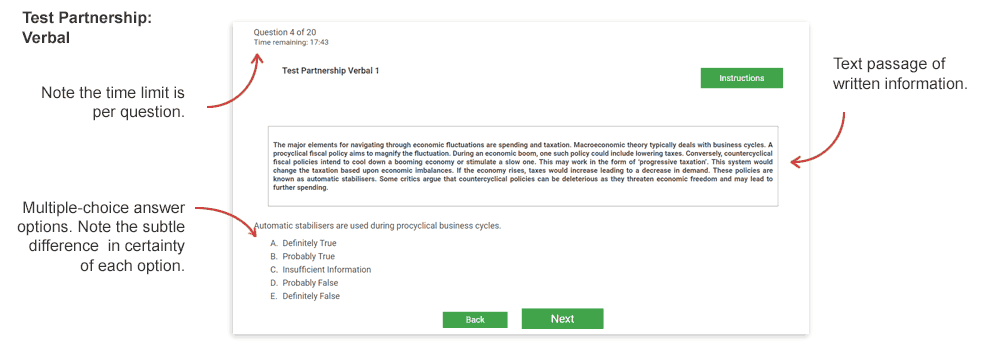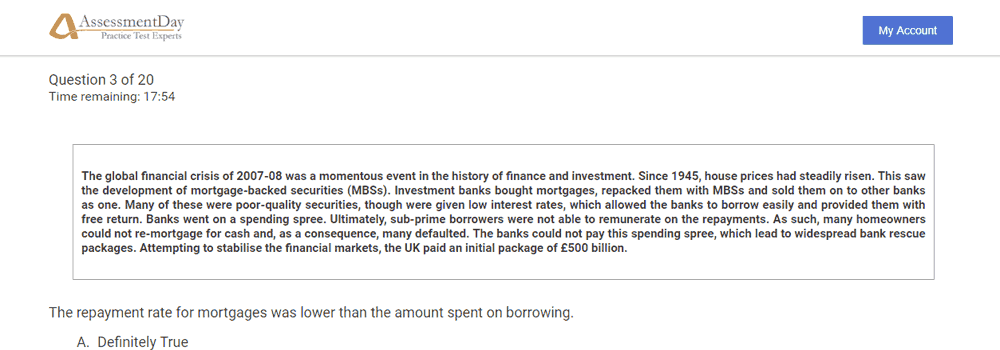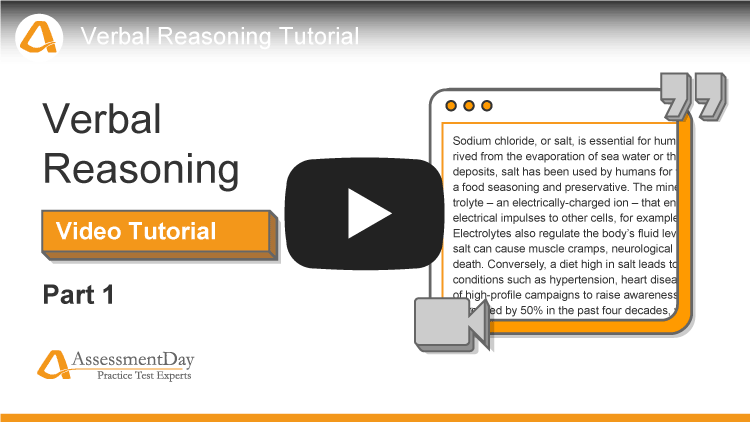Test Partnership Verbal Reasoning Tests
Practice tests, solutions, and tips to help you pass employers' verbal reasoning tests.



Page contents:
Jump to:Updated:
Test Partnership verbal reasoning practice tests
Our experts have all the advice and practice tests you need to prepare for your test. The practice tests on AssessmentDay simulate the tests used by employers, so take some of our example questions now to become familiar with the industry-standard style and layout. The best way to perform your best in a psychometric test is to be familiar with the test format and know what to expect. Practice is the best way to maximize your chances of test success.
Here are screenshots of our verbal reasoning tests:


Taking a Test Partnership verbal reasoning test
Why do employers use Test Partnership verbal reasoning tests? Because they are better at predicting candidates' job performance than interviews, CVs and other traditional methods of selection. To quickly get a feel of what a real verbal reasoning test looks like, take one of our free practice tests below.
Employers use your verbal reasoning score, together with other selection factors such as interview performance, to help them decide which candidate is most suitable for the role. Test Partnership verbal reasoning tests used in selection usually take the form of a written passage followed by a series of questions with possible Definitely True, Probably True, Insufficient Information, Probably False or Definitely False responses. It is important you know and appreciate the meaning of each response if you are to score highly.
- Definitely True - The statement follows logically from the information contained in the passage.
- Probably True - The statement is likely to be true, given the information contained in the passage.
- Insufficient Information - It is not possible to determine whether the statement is true or false without further information.
- Probably False - The statement is likely to be false, given the information contained in the passage.
- Definitely False - The statement is logically false from the information contained in the passage.
These multiple choice options are looking for the logic that takes place through verbal comprehension. The questions are asking you to identify, and demonstrate your understanding of, the components of language.
Verbal reasoning tutorial - How to answer verbal test questions
We have created a two-part verbal reasoning tutorial, in which we go through some verbal reasoning questions. This tutorial is designed to help you understand the format and process of a question.
The following video is part one of that tutorial:

Free example verbal reasoning test
Free Verbal Reasoning Test
FreeThis free shortened verbal reasoning test contains 9 questions and has a time limit of 10 minutes. This test is rated as medium and is about the same difficulty as real verbal tests graduate employers use.
Verbal Reasoning Test 1
Premium- 30 questions
- 19 mins
Verbal Reasoning Test 2
PremiumVerbal Reasoning Test 3
Premiumverbal Reasoning Test 4
PremiumIs verbal ability testing fair?
If it's done properly, yes. A verbal reasoning test is much more fair on candidates than a subjective form of assessment, such as an unstructured interview, because it presents questions of similar difficulty to all candidates and is objectively scored. The results from verbal reasoning tests also tend to be less affected by background or race, so they are beneficial to both candidates and employers.
The best way to prepare for aptitude tests
Don't take our word for it - listen to all our happy members.
Try now for free
Verbal test takers' FAQs
Q: What will my test be like?
By far the most common form of verbal reasoning test is one in which you are presented with a passage of text, then asked whether certain statements relating to that text are true, false, or impossible to say without more information. Some employers also test things such as word meaning, for example "which word is the odd one out". But these are rarely used anymore as they can be culturally biased.
Although this particular style of verbal reasoning test is the most common, it always helps to contact the human resources department of the employer and try to obtain any information you can about the actual tests you will be taking. They are normally very good at providing you with information about the test and sometimes even tell you what test publisher they are using.
Q: What will the test measure?
Verbal reasoning tests are designed to measure your powers of comprehension, reasoning, and logic. You will be tested on whether you jump to conclusions or you appreciate the limitations of a statement. If a passage says "it has been reported..." it does not follow that the reported aspect is necessarily true; only that it has been reported. Another classic example is: if the lights in a house come on, does that mean there is someone inside the building? Not necessarily. If A is bigger than B, does that mean B is small? Not necessarily. You will be tested to sort fact from inference, a lot like what's required in a real work environment. You can see why lawyers almost always have to pass a verbal reasoning test, or a critical thinking test.
Something which will not be tested by the verbal reasoning tests used by employers is spelling. The employer is trying to measure your reasoning ability, not your vocabulary or spelling. This knowledge can be learned on the job, whereas verbal ability is an innate capability unique to each person. Recruitment tests are nothing to do with old-fashioned tests such as word association or missing words.
Q: Do I need to be a fast reader?
It helps, but more important than speed is how well you understand what you are reading, and recognizing the difference between fact and inference.
Aptitude tests are normally strictly timed. The assessor will be able to see how many questions you attempted and how many of those you answered correctly. So you will need to strike a balance between attempting lots of questions and getting correct those you have attempted. For most aptitude tests you will find it difficult to answer all the questions within the time limit. However some tests allow a lot longer and they are all about your analysis and reasoning ability.